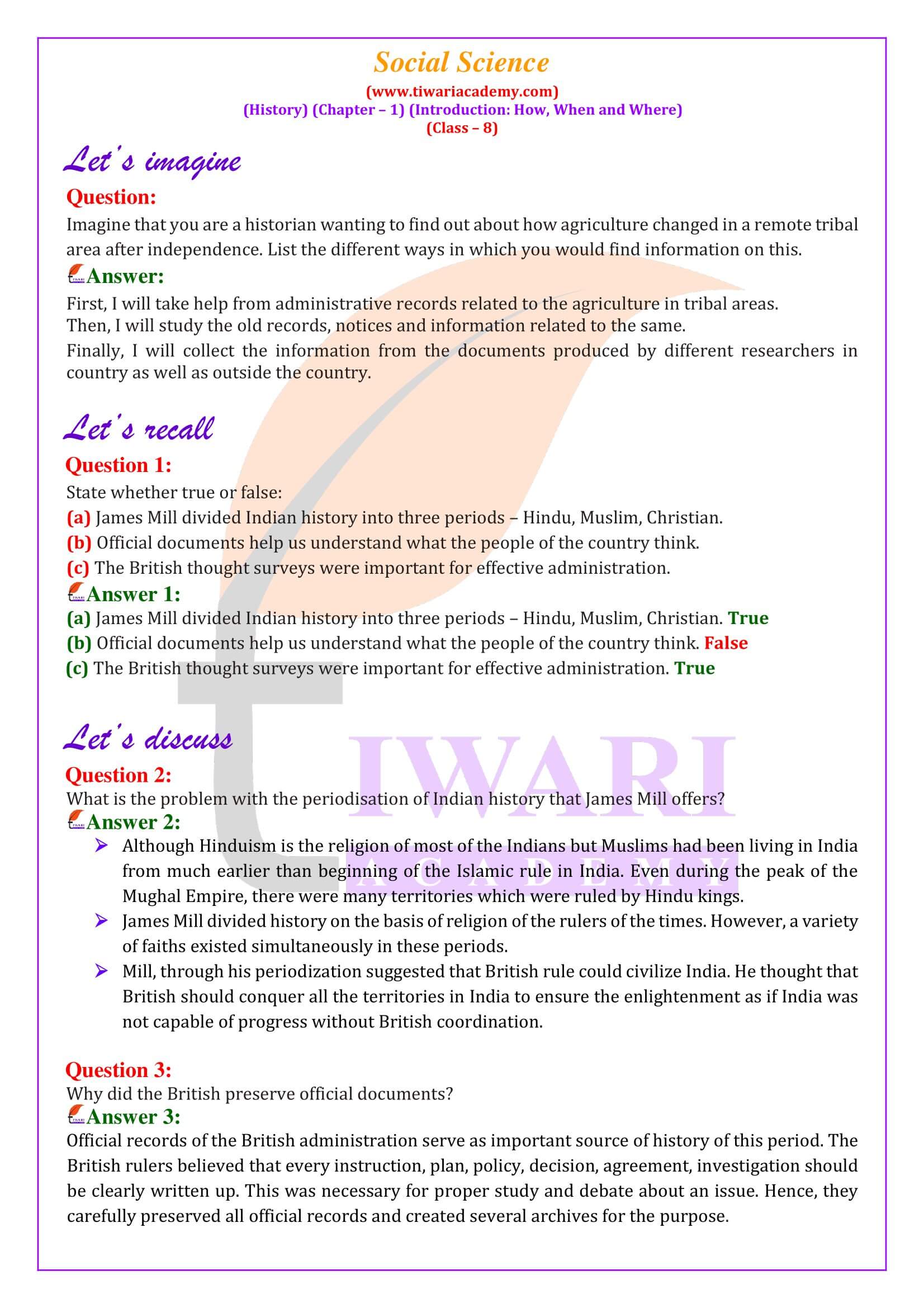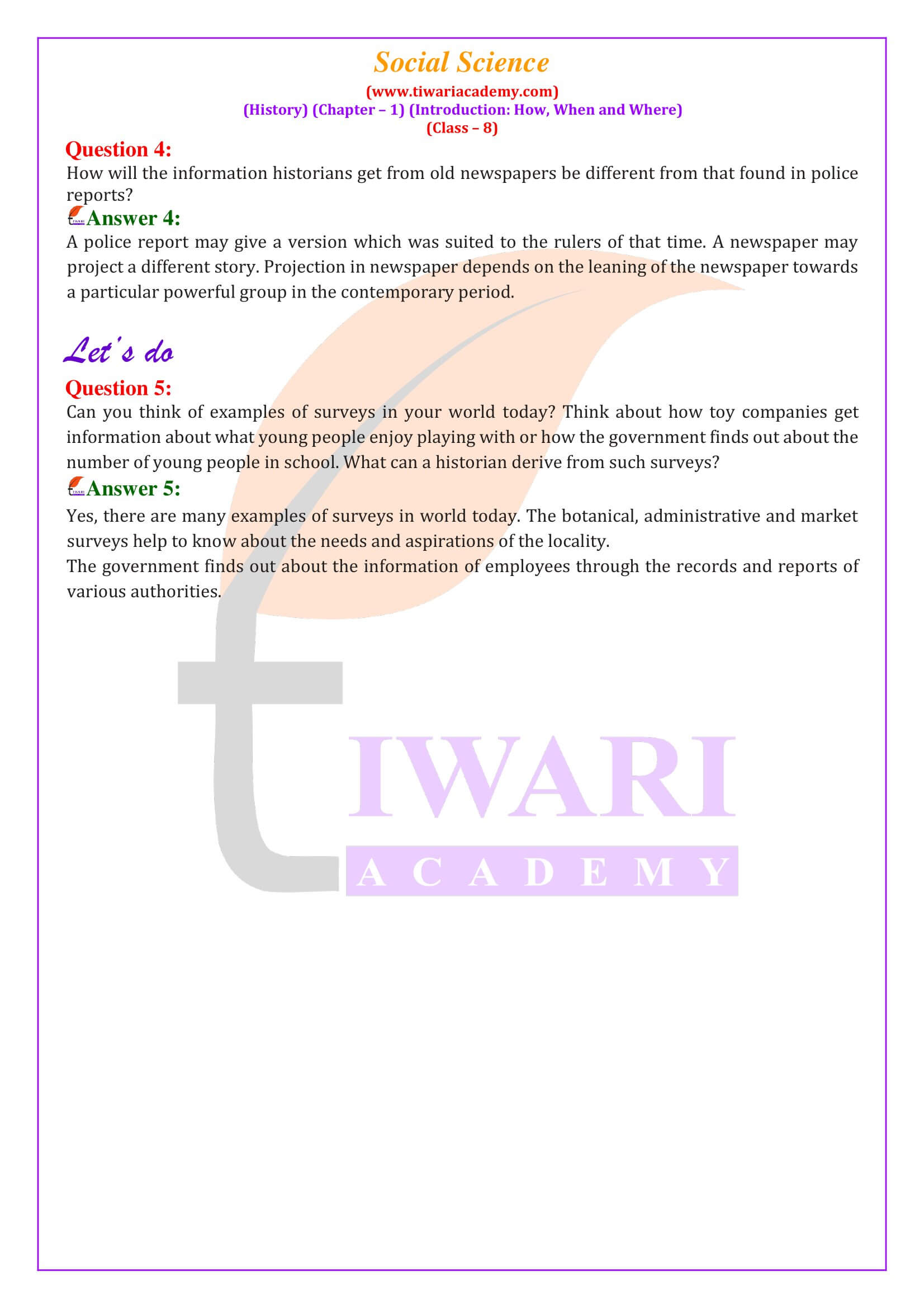NCERT Solutions for Class 8 Social Science History Chapter 1 How, When and Where in English and Hindi Medium revised academic session 2025-26. The question answers and solutions of chapter 1 for 8th History is modified as per the new rationalised NCERT textbooks issued for 2025-26 exams.
NCERT Solutions for Class 8 Social Science History Chapter 1
All the NCERT Solutions 2025-26 are based on latest class 8th NCERT Books to free download. Download NCERT Solutions offline apps for other subjects also.
Class 8 History Chapter 1 Extra Questions
What are the Importance of Dates in History?
There was a time when people heated debates about the dates on which rulers were crowned or battles were fought. Generally, history was synonymous with dates. History is certainly about changes that occur over time. It is about finding out how things were in the past and how things have changed. As soon as we compare the past with the present we refer to time, we talk of “before” and “after”.
Why are the Necessity of Historical Dates?
Normally, we do not ask historical questions about what we see around us. We take things for granted, as if what we see has always been in the world we inhabit. But most of us have our moments of wonder, when we are curious, and we ask questions that actually are historical. Sometime, during the journey, we think that when were railways built and how did people travel long distances before the age of railways. Reading the newspaper in the morning we may be curious to know how people got to hear about things before newspapers began to be printed.
What do you meant by Colonisation?
The British came to conquer the country and establish their rule, subjugating local nawabs and rajas. They established control over the economy and society, collected revenue to meet all their expenses, bought the goods they wanted at low prices, produced crops they needed for export. In this chapter it is given that the changes British rule brought about in values and tastes, customs and practices. When the subjugation of one country by another leads to these kinds of political, economic, social and cultural changes, we refer to the process as colonisation.
Class 8 History Chapter 1 Question Answers
CBSE Solutions for Class 8 Social Science History Chapter 1 How, When and Where is given below in updated form for session 2025-26. Download these NCERT solutions for offline use or use as it is without downloading online.
| Class: 8 | Social Science |
| Subject: | History |
| Chapter 1: | How, When and Where |
| Content: | NCERT Question Answers |
| Content Type: | Text and Images |
Important Questions on 8th History Chapter 1
Imagine that you are a historian wanting to find out about how agriculture changed in a remote tribal area after independence. List the different ways in which you would find information on this.
First, I will take help from administrative records related to the agriculture in tribal areas. Then, I will study the old records, notices and information related to the same. Finally, I will collect the information from the documents produced by different researchers in country as well as outside the country.
What is the problem with the periodisation of Indian history that James Mill offers?
Although Hinduism is the religion of most of the Indians but Muslims had been living in India from much earlier than beginning of the Islamic rule in India. Even during the peak of the Mughal Empire, there were many territories which were ruled by Hindu kings. James Mill divided history on the basis of religion of the rulers of the times. However, a variety of faiths existed simultaneously in these periods. Mill, through his periodization suggested that British rule could civilize India. He thought that British should conquer all the territories in India to ensure the enlightenment as if India was not capable of progress without British coordination.
Why did the British preserve official documents?
Official records of the British administration serve as important source of history of this period. The British rulers believed that every instruction, plan, policy, decision, agreement, investigation should be clearly written up. This was necessary for proper study and debate about an issue. Hence, they carefully preserved all official records and created several archives for the purpose.
How will the information historians get from old newspapers be different from that found in police reports?
A police report may give a version which was suited to the rulers of that time. A newspaper may project a different story. Projection in newspaper depends on the leaning of the newspaper towards a particular powerful group in the contemporary period.
Can you think of examples of surveys in your world today? Think about how toy companies get information about what young people enjoy playing with or how the government finds out about the number of young people in school. What can a historian derive from such surveys?
Yes, there are many examples of surveys in world today. The botanical, administrative and market surveys help to know about the needs and aspirations of the locality. The government finds out about the information of employees through the records and reports of various authorities.
Important Notes on 8th History Chapter 1
Periodisation
In 1817, James Mill, a Scottish economist and political philosopher, published a massive three-volume work, A History of British India. In this he divided Indian history into three periods – Hindu, Muslim and British. This periodisation came to be widely accepted.
British rule represented all the forces of progress and civilisation. The period before British rule was one of darkness.





